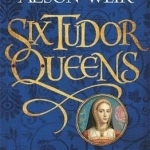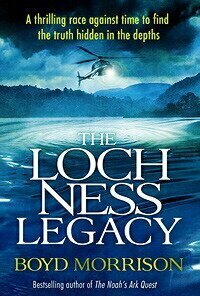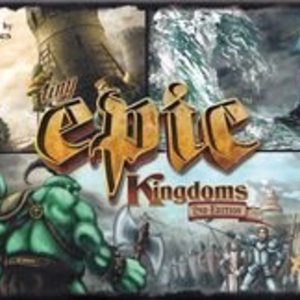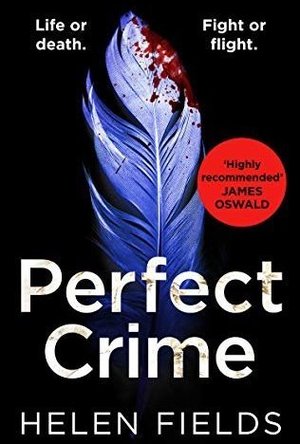Deborah (162 KP) rated Six Tudor Queens: Katherine of Aragon, the True Queen: Six Tudor Queens 1 in Books
Dec 19, 2018
During the third quarter of the book, we get a lot of Henry coming in to visit Katherine, giving us a bit of plot exposition and then having a strop and stomping out like a child having a tantrum. After about the tenth occurrence this gets rather tedious and doesn't feel altogether likely.
I was slightly weirded by the implication that Katherine on arrival quite fancied the ten year old Henry and the bit in the Tower with the 'ghost lady' and the shivers down the spine in Peterborough cathedral seemed out of place and both only really play off if you have a knowledge of the period already, in which case you really don't need to be reading this.
Finally, for all the historical stuff Weir has stuffed in there, she really does need to pay better attention to her geography. I know Ampthill isn't that far from Dunstable, but I think I little effort would inform her that it's more like 14 miles and not the 4 she has in the book!
While the writing isn't awful, it's just not engaging and the book is far too long and becomes tedious. Does Weir really believe that Katherine believed that, after everything that he had done, Henry would meekly accept the Pope's vastly overdue ruling, put Anne and Elizabeth and the change of a male heir aside along with his leadership of the Church of England? hindsight is a wonderful thing, but I find it hard to beleive that Katherine was as stupid and naive as she comes across here. She says she still loves Henry and wouldn't do anything against him, yet writes to the Pope and the Emperor with a clear intention of inciting war! I think Weir means to make her sympathetic, but I just found her exasperating. I would recommend some good non-fiction book on the period ahead of this.
Phil Leader (619 KP) rated The Loch Ness Legacy (Tyler Locke #4) in Books
Nov 20, 2019
This book immediately gripped me. I have picked up many adventure thriller type books from many authors and few have impressed me. However Boyd Morrison manages to avoid the usual pitfalls. His characters are likeable and share realistic dialogue and act according to their motivations - even the main villain who is just ever so slightly over the top but still manages to be realistic as a character.
The action scenes - and there are plenty featuring more chases and fight scenes than a whole franchise of movies - are extremely well handled. People tire during fight scenes, nobody is a crack shot with a gun, injuries are realistic.
The plot cracks along as Locke and his team uncover the secrets one at a time. There are clues to solve and the whole time they are racing to beat the terrorists who always seem to be one step ahead.
I feel I must make special mention of the dialogue of the English and Scottish characters. A lot of American authors tend to assume everyone in the UK is either a 'cor blimey guv'nor' cockney or an 'I say old chap' aristocrat and so to my ears the dialogue always sounds phoney. Morrison does not fall into this trap and that really did enhance the immersion in the story.
Yes ultimately this is a hunt for the Loch Ness Monster but really that's just a McGuffin to drive the plot, and an ingenious one at that. I'm not aware of anyone else using Nessie in this kind of book and Morrison handles it well.
Overall a terrific book, well worth a read and would make a terrific holiday book. I've already got the first Tyle Locke novel lined up to read and am looking forward to it immensely. Morrison has immediately become on of my favourite authors. I noticed that he is credited as co-writer on the latest Clive Cussler Oregon Files book (Piranha) and will need to read that too, I suspect that he will inject some energy into the franchise and is a good choice as this book reads like one of Cussler's first novels - in fact I'd say even better.

100 Things: Planes, Jets, Airports. Picture Books
Book and Games
App
100 Things: Planes - for babies, small kids & toddlers - delivers 100s of whopping HD photos &...

Lonely Planet England
Lonely Planet, Neil Wilson, Fionn Davenport and Oliver Berry
Book
Lonely Planet: The world's leading travel guide publisher Lonely Planet England is your passport to...
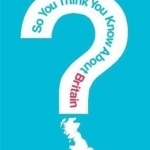
So You Think You Know About Britain?
Book
When it comes to immigration, the population explosion, the collapse of the family, the north-south...

FlyMaps | 3D Maps + Wikipedia
Navigation and Travel
App
FlyMaps uses 3D maps to visit cities around the world. Including more than 200 cities and places....

Pearl's Peril
Games
App
PLAY THE PERFECT HIDDEN OBJECT GAME TODAY Rediscover love, mystery, romance and grand adventure...

Architecture of Radio
Education and Entertainment
App
The infosphere, Visualized. Every time we use our phones, tablets or laptops we are entering an...
Purple Phoenix Games (2266 KP) rated Tiny Epic Kingdoms in Tabletop Games
Jul 30, 2019
In Tiny Epic Kingdoms, you are the ruler of (you guessed it) a tiny kingdom. You, however, are not content with simply maintaining your realm – you have plans to expand your borders and make your kingdom not-so-tiny! Send your adventurers out to explore new lands, learn new magics, construct towers to assert your dominance, and fight off others who would stand in your way! Do you have the strategy necessary to outwit your competitors and grow your kingdom? Play to find out!
DISCLAIMER: There are several expansions to this game, but we are not reviewing them at this time. Should we review them in the future we will either update this review or post a link to the new material here. -T
Tiny Epic Kingdoms is a game of worker placement, area control, and action point allowance. Players take turns gathering resources, buildings towers, researching magic, or exploring (and potentially waging war) in new lands. As the active player, on your turn you will select and perform one of the six available actions from the Action Card: Patrol, Quest, Build, Research, Expand, or Trade. Following your action, and still on your turn, the remaining players will either decide to perform the same action you chose, or collect resources. Once everyone has had the chance to act, your turn is over. The next player now becomes the active player and the process repeats with one big change – the action you chose on your turn is no longer available for selection. Each subsequent active player will always have 1 fewer action choice on their turn. This process repeats until there are no more actions available. When this happens, the Action Card is cleared and all actions are available once more for selection. Strategy is key – which action can you choose on your turn to best benefit you while also inhibiting your competitors? The game ends at the end of the turn in which one of these three things has happened: a player has all of their meeples in play, a player has built the 6th level on the tower card, or a player has reached the 5th level of magic on their faction card. End-game points are scored based on meeples in play, magic level, tower level, and control of Capital Cities. The player with the highest score wins!
For such a small game, there’s definitely a fair amount of strategy involved in Tiny Epic Kingdoms. You’ve got to decide on the best approach for you, and it must be adaptable to any given situation. Do you play it safe, quietly collecting resources, trying to achieve your end-game goals the fastest? Or do you venture out to confront your opponents, trying to usurp their territory and resources and take them out as your competition? Or maybe you try to stay civil, but an opponent is threatening your progress and now you’ve got to fight back? There are lots of strategic options, and every game feels like a new challenge.
One thing I enjoy about Tiny Epic Kingdoms is that you get to act on every single turn, even if you aren’t the active player. You don’t have to sit there and watch your friends play – you have the chance to benefit during every single turn, even if it’s merely collecting resources. The opportunity to act on every turn also adds a little bit of ‘take that’ to this game. I might choose an action on my turn as the active player that I know one of my competitors cannot perform – thus forcing them to collect resources and waste the opportunity to perform that specific action for an entire round. And since that action cannot be picked again until all available actions have already been chosen, I’ve successfully blocked their progress in a certain area of play. Your strategy has to extend beyond just your turn as the active player – you must consider all options for your opponents as well.
The thing I don’t necessarily like about Tiny Epic Kingdoms is that the gameplay can be a little stale. Unless you’re playing with people who actively try to engage with you, it is extremely easy to just stay in your own realm and not even interact with anyone at all. There’s no forced interaction in this game, and although it is admittedly nice sometimes, mostly it just feels like we’re all playing the same game alone. It’s like we all just take turns performing/following actions until someone has triggered the end-game.
Overall, I like Tiny Epic Kingdoms. It’s not my favorite Tiny Epic game, but it’s a good one. There’s a decent amount of strategy involved, but at times it can feel more like a ‘take that’ type game to me. The lack of forced player interaction can lead to dull gameplay and a lackluster experience. It’s not a bad game. It’s just not the most epic Tiny Epic game out there, in my opinion. That’s why Purple Phoenix Games gives it a regal 14 / 18.
Ross (3284 KP) rated Perfect Crime in Books
Feb 19, 2019 (Updated Feb 19, 2019)
The 5th book in the increasingly badly titled "DI Luc Callanach" series (he is hardly in this one!) follows much the same template as the other 4 books. A body is found in mysterious circumstances, here it is the body of a young man who appears to have thrown himself from the top of a tower in East Lothian. Soon thereafter, other bodies start to turn up, all looking like suicides or are people who had previously tried to commit suicide. At the same time, another body turns up, this time with a personal connection to one DI Callanach. So again we have the two investigations running in parallel. Though because of the apparent connection, the eponymous DI Callanach is taken off active duty and is largely absent for the second half of the book.
The main investigation is interesting: someone taking against those who do not value their life and have tried to end it in the past, and he decides to end it for them. However, there is a twist along the way that just did not feel right. For this murderer to suddenly become a Red Dragon-style character was somewhat at odds with the story at that point.
The lesser investigation was more interesting as there was so much evidence suggesting Callanach committed the murder, though we believed he hadn't.
As with previous books, a story written in Edinburgh (or other cities with an identity) by someone who doesn't live there has a good chance of missing the mark with the dialogue. People we are led to believe are proper sumbags do not come across as that, their phrasing is just so wrong. I had found this in the previous books, where incidental characters had no discernible voice or characteristics and were just vanilla plot devices.
Similarly, the murderer at one point uses a phrase no Scotsman has ever uttered and that took me right out of the book.
The plot is more or less faultless, with all events and motives seeming plausible, except one issue right at the end where an item of evidence was so mis-handled as to be laughable, but served the plot perfectly.
On the whole, this was a good enjoyable read, but I had guessed the identities of the murderers quite early on. Far from original and moments that just felt like clangers.
I am guessing this is almost the last we'll see of Luc Callanach, who has (rightly) been relegated to support cast from book 2, in favour of the strong, better-defined, female character.
